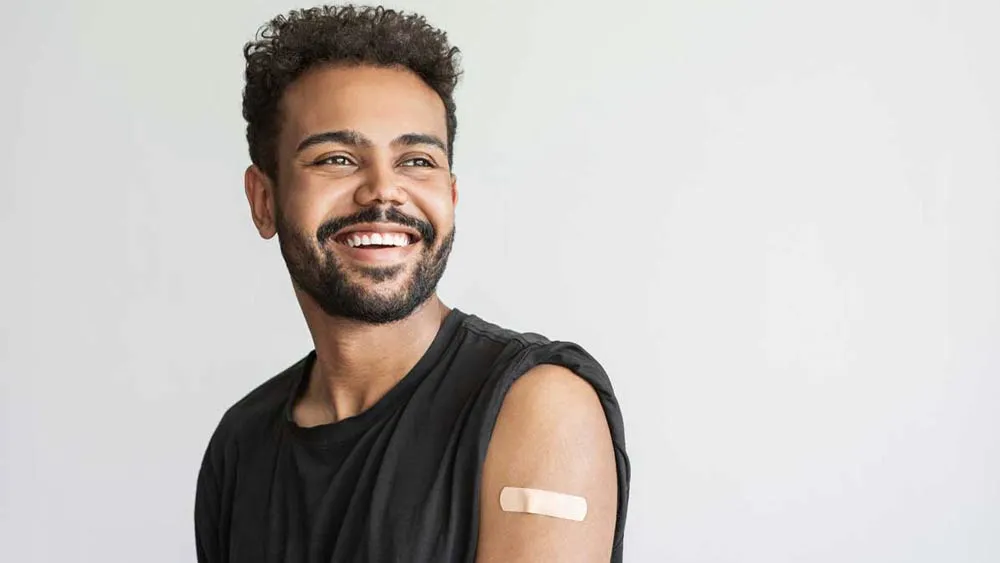July 13, 2016
Experimental HIV Vaccine Starts Large-Scale Clinical Trial In November
Winnie McCroy READ TIME: 4 MIN.
This November, the HIV Vaccine Trials Network and the HIV Prevention Trials Network will kick off HVTN 704/HPTN 085, also known as Antibody Mediated Prevention (AMP), a Phase 2b clinical trial to evaluate the safety and efficacy of VRC01, a broadly neutralizing monoclonal antibody (bnAb) vaccine. AMP is the first study to evaluate whether bnAbs are effective in reducing acquisition of HIV-1 infection among at risk populations.
"Injections or infusions of antibodies to prevent acquisition of an infectious disease have been utilized in medicine for decades," said Larry Corey, M.D., study chairperson for HVTN 704/HPTN 085 and principal investigator for the HVTN. "The remarkable advance in technologies to isolate and manufacture human monoclonal antibodies in concentrations high enough to potentially prevent HIV is a major advance and provides the underlying principle for our enthusiasm for these trials."
A smaller trial, which began in February 2015 and involved 252 volunteers, tested the vaccine regimen for safety and to see whether it elicited the predicted immune responses. The upcoming large-scale trial is scheduled to launch in November and involve 5,400 HIV-uninfected men and women in South Africa. It will test for efficacy, or whether the vaccine actually protects those who receive it from becoming infected with HIV.
Corey said that the February 2015 trial "established very good safety, with a very significant comfort side effect profile," which means it could be effective, with few side effects.
Because it is unethical to deliberately expose people to HIV, testing to see whether a vaccine provides protection involves waiting several years and seeing how many people become infected naturally. All participants will receive a total of five injections over a year, with volunteers randomly assigned to either the experimental vaccine or a placebo.
Blood will be drawn at different times to check for HIV infection and immune responses. Researchers will look for correlates of protection among a South African population at high risk for infection.
"Everyone will be counseled about the risks of HIV and HIV prevention, and all will recommend circumcision for men, use of condoms, and methods to reduce the risk of HIV infection," said Dr. Corey. "So it's a classic double-blind placebo control group in which you vaccinate one group and give the placebo to another, and evaluate whether it reduces the frequency of HIV acquisition."
The AMP is being sponsored and funded by the National Institute of Allergy and Infectious Diseases (NIAID), part of the National Institutes of Health. The NIAID Vaccine Research Center discovered the VRC01 antibody and manufactured it for this trial.
Rather than delivering a vaccine, the AMP trial will use an intravenous infusion, or IV, to deliver so-called broadly neutralizing antibodies (or a placebo) to trial participants. Such antibodies are considered the "holy grail" of HIV vaccine researchers because they could potentially protect people from infection by almost all strains of the virus. But so far, no one has figured out how to make a vaccine that induces them.
The experimental vaccine regimen tested in Thailand and the modified version being tested in South Africa elicit antibodies, but they are not broadly neutralizing. Corey said that the vaccine they will use will come from the clade C subtype of HIV, which circulates in sub-Saharan Africa.
If the experimental antibodies being tested in the AMP trial provide protection as hoped, information gleaned from the study could help scientists figure out how to reverse-engineer a vaccine to elicit the antibodies at the concentrations needed.
"We will consider the study a success if it reduces HIV acquisition by 50 percent," said Corey. "That is where we feel we are able to have a vaccine that we could transport to people on a more widespread basis. If it's higher than 50 percent, we're going to be ecstatic."
The results of the trial will be released in late 2020. Corey said that a vaccine could reach the market as soon as two to three years later, or as long as four, depending on the ability to manufacture it in a widespread way. It will be an integral part of reaching the end of the HIV/AIDS epidemic.
"I think a vaccine is required to really have an AIDS-free generation, which for me means we no longer have 2 million cases a year of HIV acquisition, but in entire globe maybe 10,000 or 5,000 -- and eventually 300 infections in US, where we currently have 45,000 a year," said Dr. Corey. "To do that for any STI in a person who doesn't know they have it because there's no symptoms, that requires a vaccine. That's the quest here; that's why vaccine research is so important."
For more information, visit www.hvtn.org or www.hptn.org
Winnie McCroy is the Women on the EDGE Editor, HIV/Health Editor, and Assistant Entertainment Editor for EDGE Media Network, handling all women's news, HIV health stories and theater reviews throughout the U.S. She has contributed to other publications, including The Village Voice, Gay City News, Chelsea Now and The Advocate, and lives in Brooklyn, New York.


